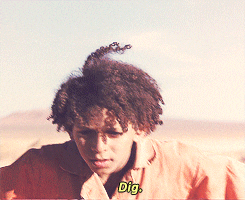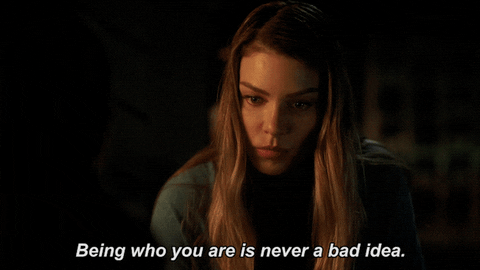Jump In, the Water’s Fine
You don’t need to be cautious. It’s okay to start where you are. Others have gone before you. Someone has attempted what you’re attempting now. The most dangerous thing about swimming isn’t the act of doing so, it’s misjudging your ability to swim in the conditions you’re facing. This takes more skill than many might assume. Your ability to swim is not linear. It depends equally on your personal level of preparation, practice and experience, as it does on the qualities of the water you are attempting to dive into.
You’ll have to forgive my knack for blending analogies, but my point is that whatever it is you’re applying yourself to, the act itself is likely not harmful. Ignore fear. Focus on the variables you can control.
Start Digging
The most important step is the first one - it needn’t be a large step but if you don’t take it, you won’t move. Taking that first step requires two things: discipline, and anticipation. Discipline is the art of doing what must be done - something I discussed in Issue 12. Anticipation is understanding that to reach your destination, you’ll need to start moving. And that begins with the first step. If you want to have a well to drink from by the time you’re thirsty, you’ll have to start digging. It’s as simple as that.

Sharpen Your Edge
Efficient digging requires efficient tools. This takes two forms - an efficient mind, and an efficient body. Tools only become sharper with friction, and friction takes both effort and intentionality. The easiest path will always be the path of least resistance. You’ll need to train your brain to defy that basic instinct. Be wary though, too much friction can cause damage in the same way that throwing yourself in at the deepest end of a body of water doesn’t necessarily mean that you’ll swim or cope well. There’s no need to kill yourself. If you push too hard too early, you’ll drown and forever become wary of attempting the task again.
This is why people end up with the fallacious assumption that they’ve ‘tried that and it didn’t work’. Far too often people attempt the hardest version of a task they hope to undertake and recoil when, quite naturally, they don’t yet have the skills or fortitude to be competent. Build up your mental resilience by starting at a level where you feel just enough friction to be uncomfortable, but not enough to be arduous. You can’t run a marathon by wearing yourself out in the first mile.
The continuous practice of digging will refine your muscle memory and lower the mental specter of resistance.
Excavate Your Unique Skills
Don’t do things simply because others are doing them. Build systems and processes that work for you based on your individual skills, needs, and goals. Set your own terms. Your success should only be judged by the point at which you started. It’s easy to give into contrast bias and either become overconfident or lose hope completely, by relying on external barometers of success.
It’s often said that the biggest mistake you can make in running is to look to the right or the left. You’re expending unnecessary energy, and the simple act of observing others can have unintended effects on your own performance.
Your unique blend of skills will set you apart. Lean into what comes naturally to you.

Dig Deeper
Do more than the bare minimum - the more you prepare in advance, the less likely you are to be surprised by changes in circumstance or lack of creative headroom.
Don’t assume that the little you’ve done will perpetually be enough. Consistency is key. The best time to quit was at the beginning. From then on you’re building up a reserve of compounding returns from each further iteration. You won’t see an immediate reward from each further iteration, but with momentum comes velocity and eventually, returns come in a hurry.
Completely agree with this!
— David (@Delikwu) May 22, 2020
People gravitate to intensity because momentum feels good, but burn out when they don’t see results.
There’s no immediate reward for iterative progress but the benefit of consistent effort over time compounds!https://t.co/jZIsYcr6E9
Don’t leave the compounding fruits of your previous efforts on the table. It makes no sense for a farmer to give up on a field after successfully planting all the seeds, simply because maintenance takes a little work. In your personal life, there isn’t the immediate assurance of a predetermined harvest-time, but the harvest is inevitable regardless. You need only till the fields until the fruit of your efforts reveal themselves.
Remember that an experienced farmer who plants the right seeds will still be standing in a seemingly empty field for months to come. You may look silly for continually pruning skills, knowledge, and habits that are yet to fully mature - but if you want the rewards, stay the course.
Maintaining Your Well
Continue to curate your processes - prune your fields; maintain your well. The harvest may be automatic if the right seeds have been planted, but sufficient care will greatly increase the quality of your output. Consider how you can refine and improve your approach to basic tasks. How can you optimize your conditions for work/creative thinking?
Developing an efficient system is a great start but that’s not the end - continually look for ways to improve. The easiest ways to do this are through further reading, and by learning from the mistakes of others. Sharpen your skill of foresight to ensure you can adapt to changing conditions before it’s too late to make necessary changes. That’s the true meaning of digging your well before you’re thirsty.
If you have any further thoughts, I’d love to hear them. Reply via email, leave a comment or send me a tweet!

This week on The Knowledge
This week I was joined by BBC journalist Hannah Ajala who's been traveling through Africa since last year. She shared stories and lessons learned while traveling, as well as her experiences now, dealing with the coronavirus pandemic in Nigeria.
You can listen to the episode now on ‘The Knowledge’ wherever you listen to podcasts!

Reading list
Books I’ve read/seen/will impulsively buy and add to my “to read” shelf on Goodreads. Recommendations from newsletter readers are always welcome:
- The Terrible by Yrsa Daley-Ward - wishlisted. Someone recommended this in response to one of my recent Instagram posts, so now I have to read it!
- 100 Tricks to Appear Smart In Meetings by Sarah Cooper - impulsively bought. A lot of my favourite political journalists in the US follow Sarah, and she’s been making hilarious videos about Trump - obviously, I had to buy her book.
- A Small Place by Jamaica Kincaid - impulsively bought. This was recommended by a reader and I’m terrible because I can’t find the message to get their name. However, it’s a great read. Thank you!
Things I’m loving
Films and shows:
- The Man From U.N.C.L.E - I don’t think I have ever been more in love with the wardrobe from a piece of cinema; Guy Richie did a marvellous job with the tone of this film. A mean-spirited Guardian review reduced it to “boring, hot guys suavely saving the world” and that is exactly why I will keep coming back.
- Avatar: The Last Airbender - probably the greatest animated series ever made, and it’s finally on Netflix. I’m not saying you won’t be allowed into heaven if you haven’t watched it, but why risk it?
Resources:
- Sweatcoin - I was introduced to this app by Rachael, a reader, and while some of the things in the store are pricey, you literally earn free money by walking. You’re getting paid for something you were going to do anyway (I hope) and that’s good enough for me. Also, apparently I’m already in the top 10% just by minding my business and exercising!
- RescueTime - I’ve been using this app forever to count how much time I spend on devices, and exactly what I’m spending that time doing. It runs in the background but every Sunday I’ll get an email letting me know my “Productivity Pulse” for the week. Just another tool to make me feel guilty for the time I waste on Instagram 🙃✓
Let me know if you have any book, video, audio, or resource suggestions for next week. Feedback is welcome too! Email me or drop me a tweet here.
Until next time!!






